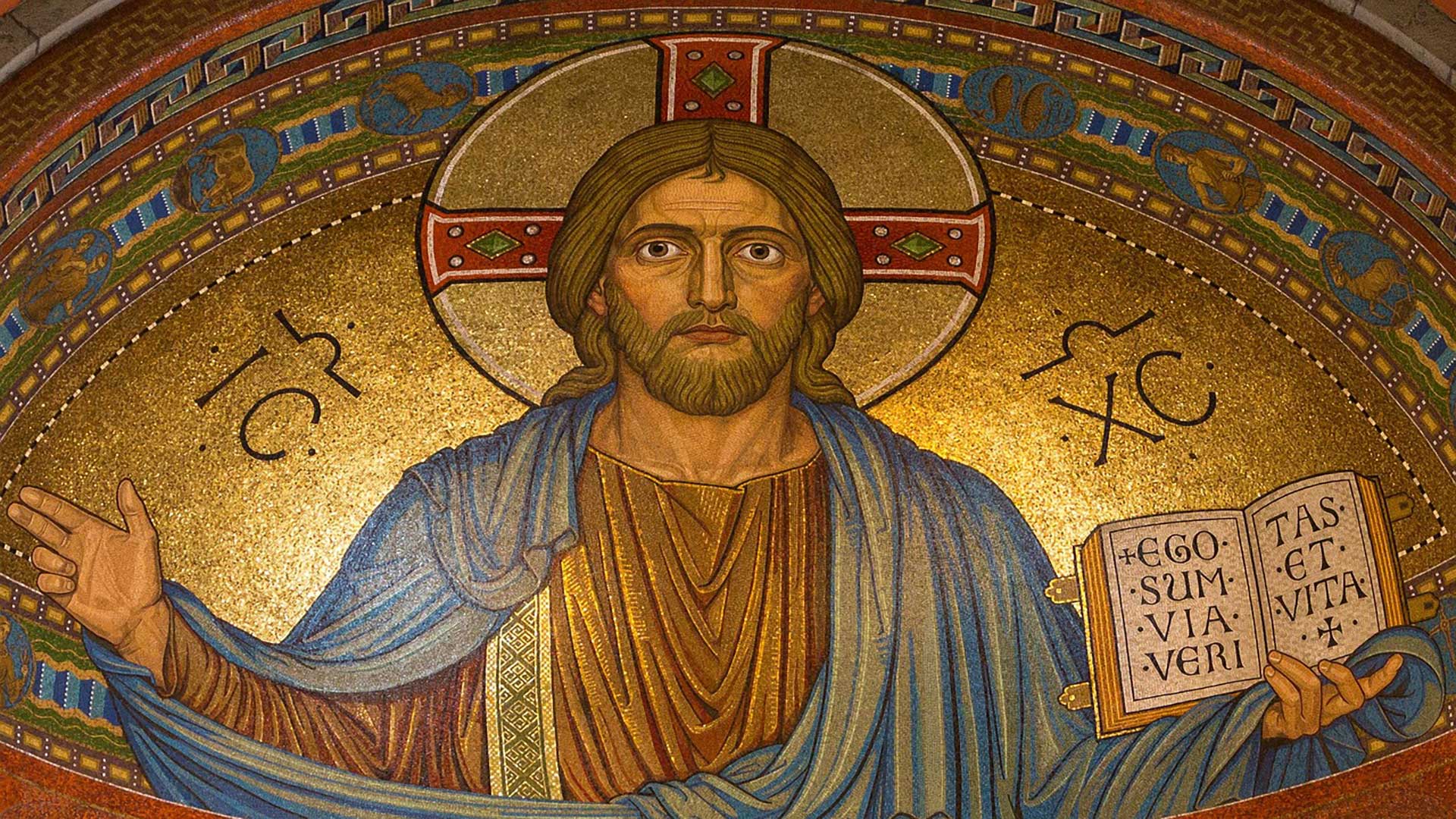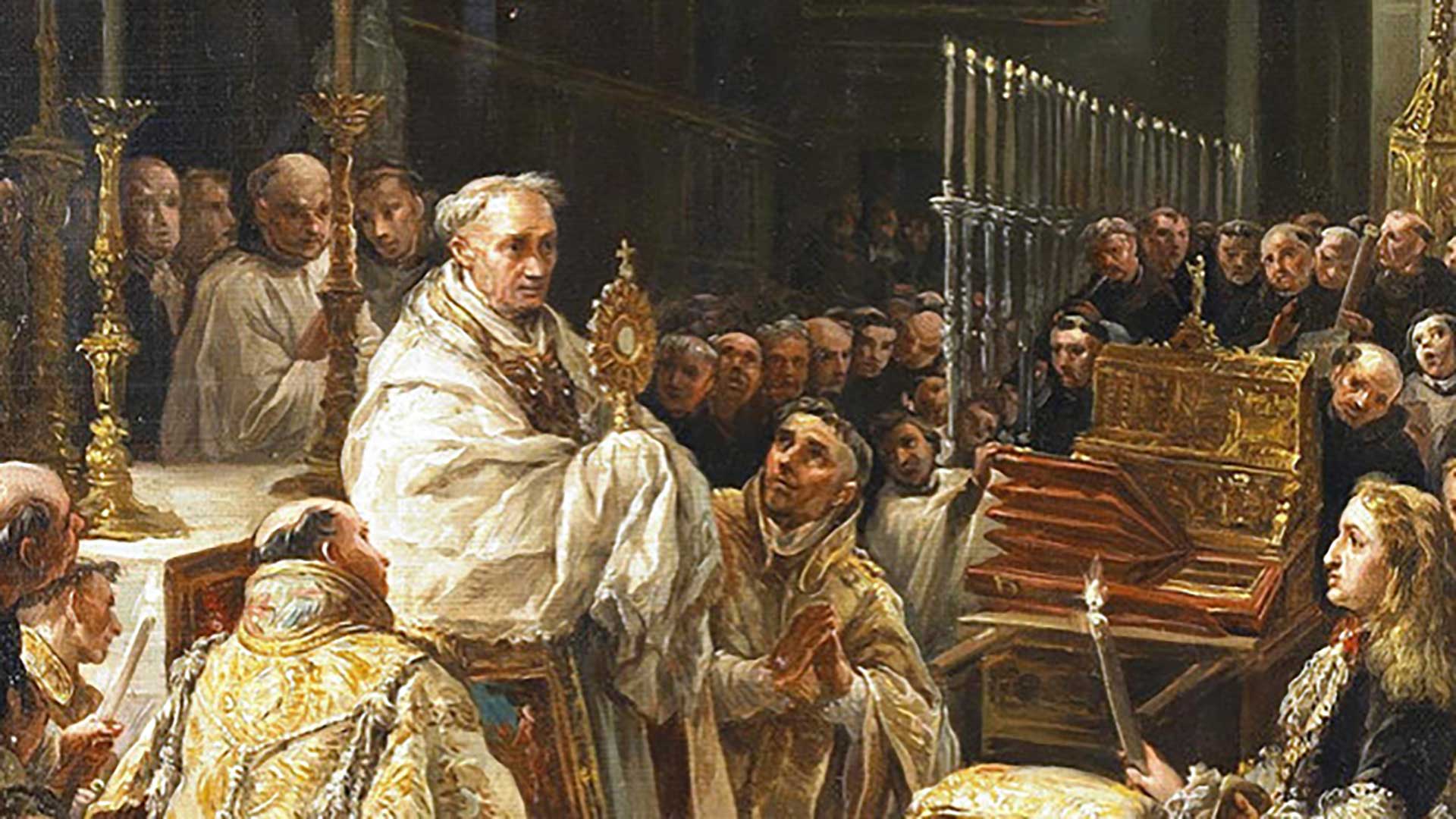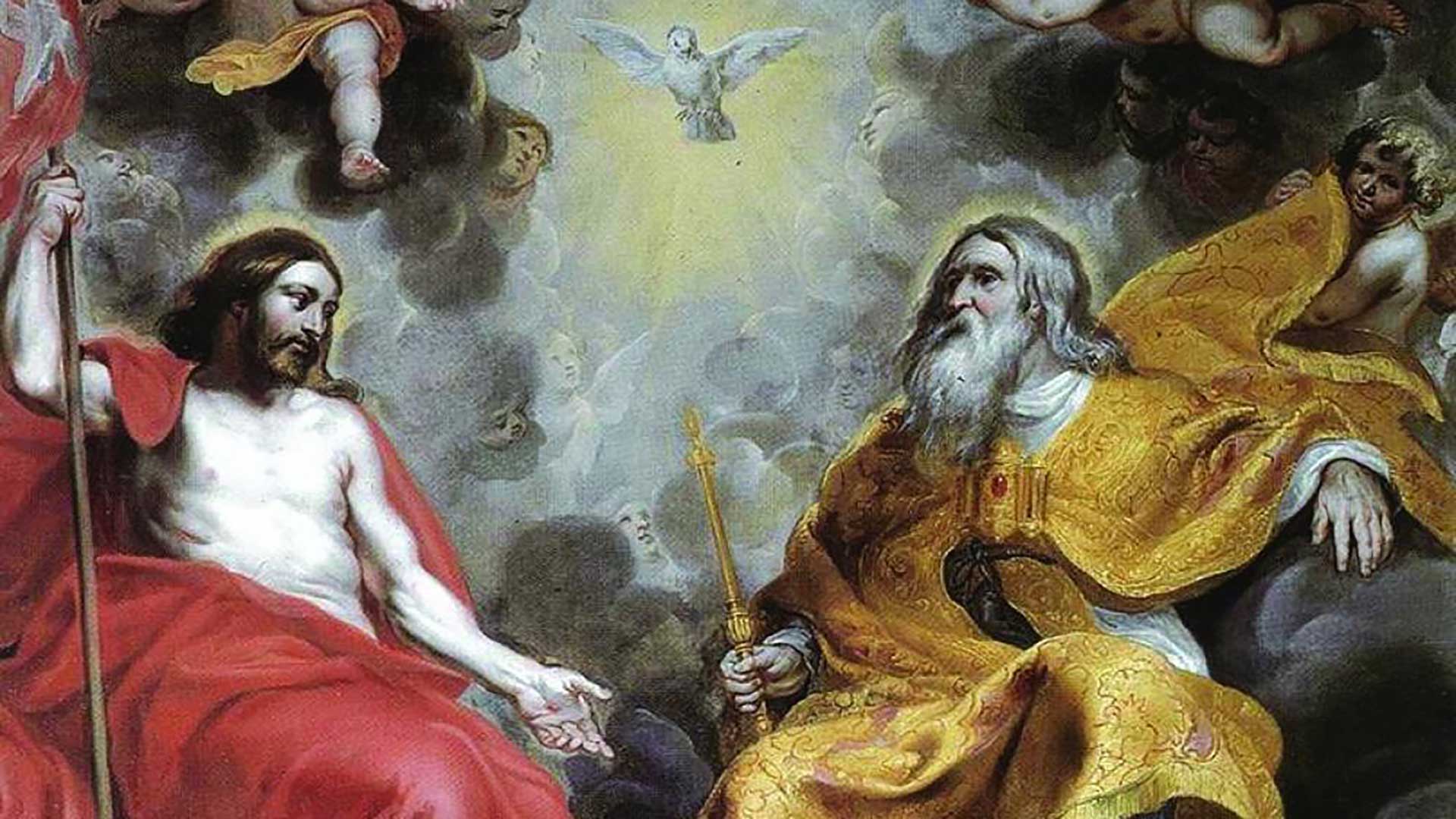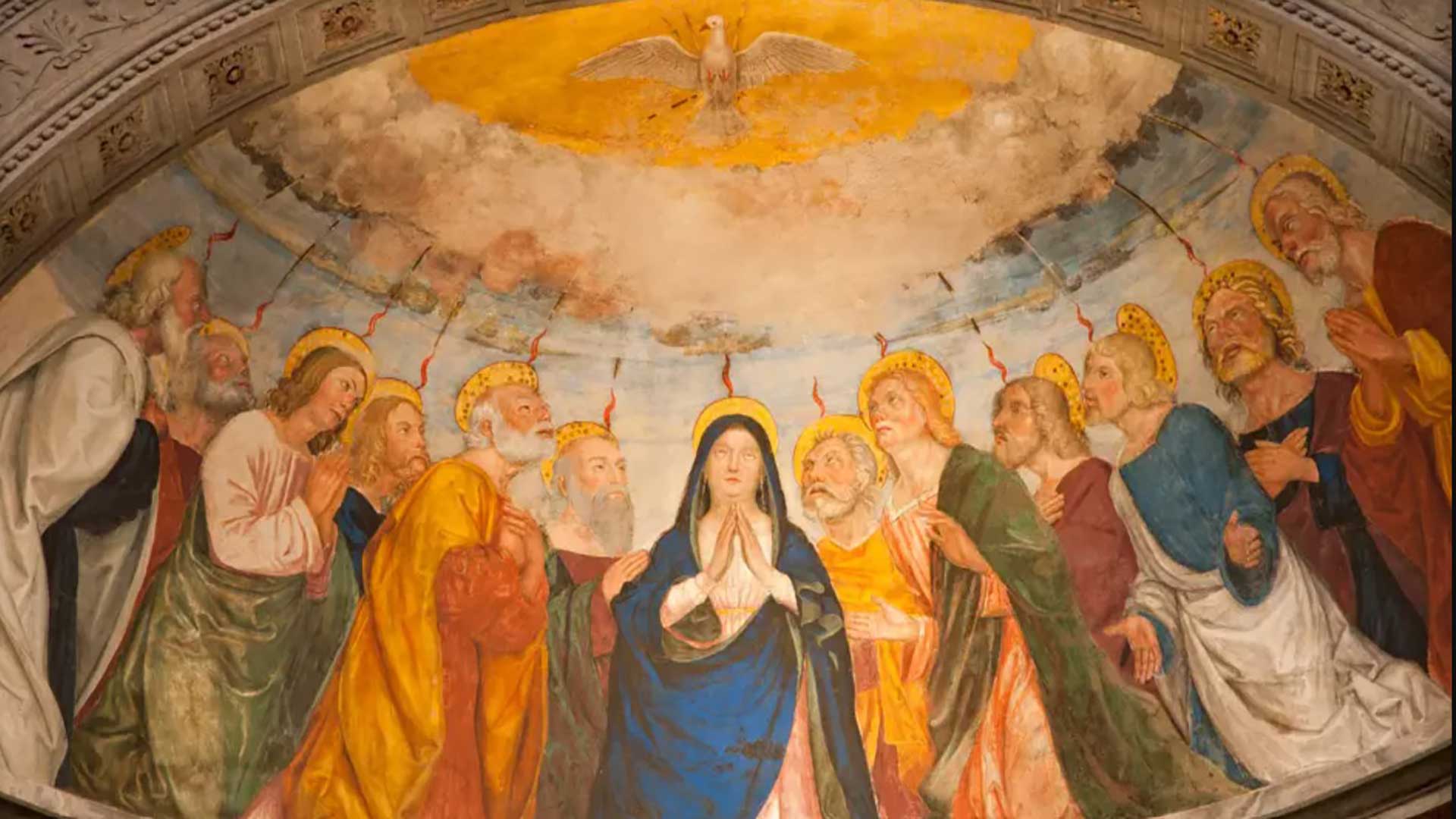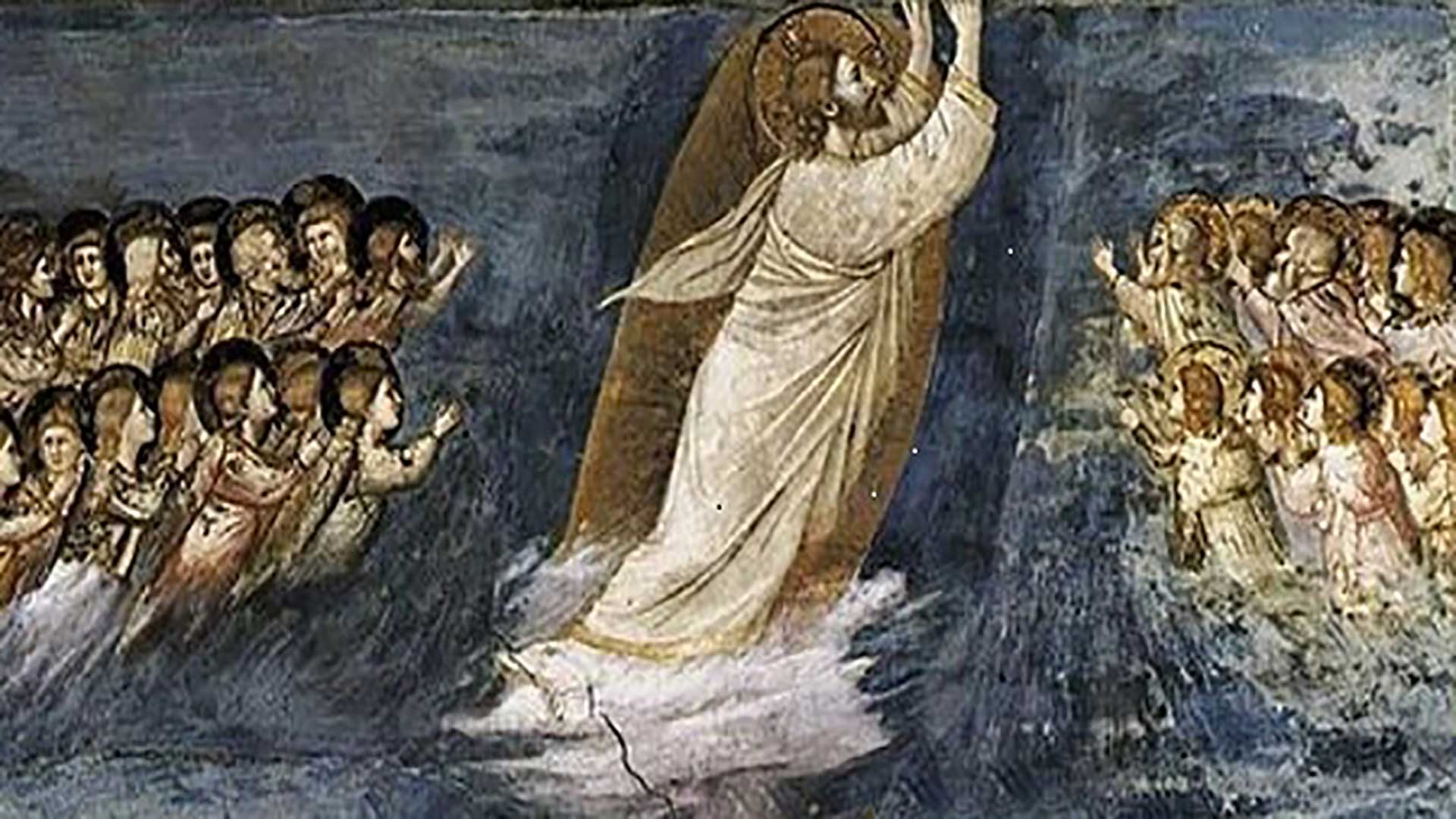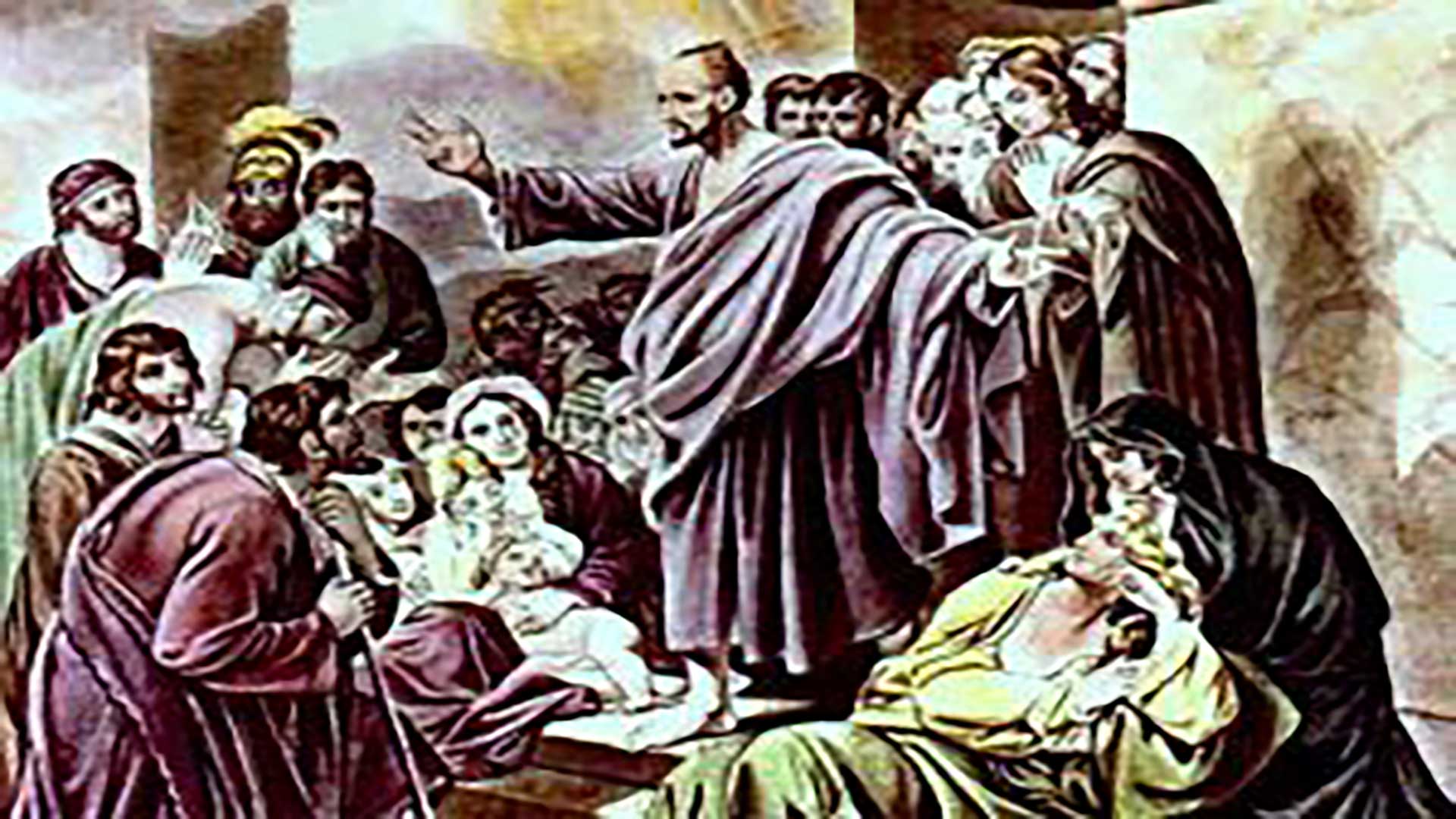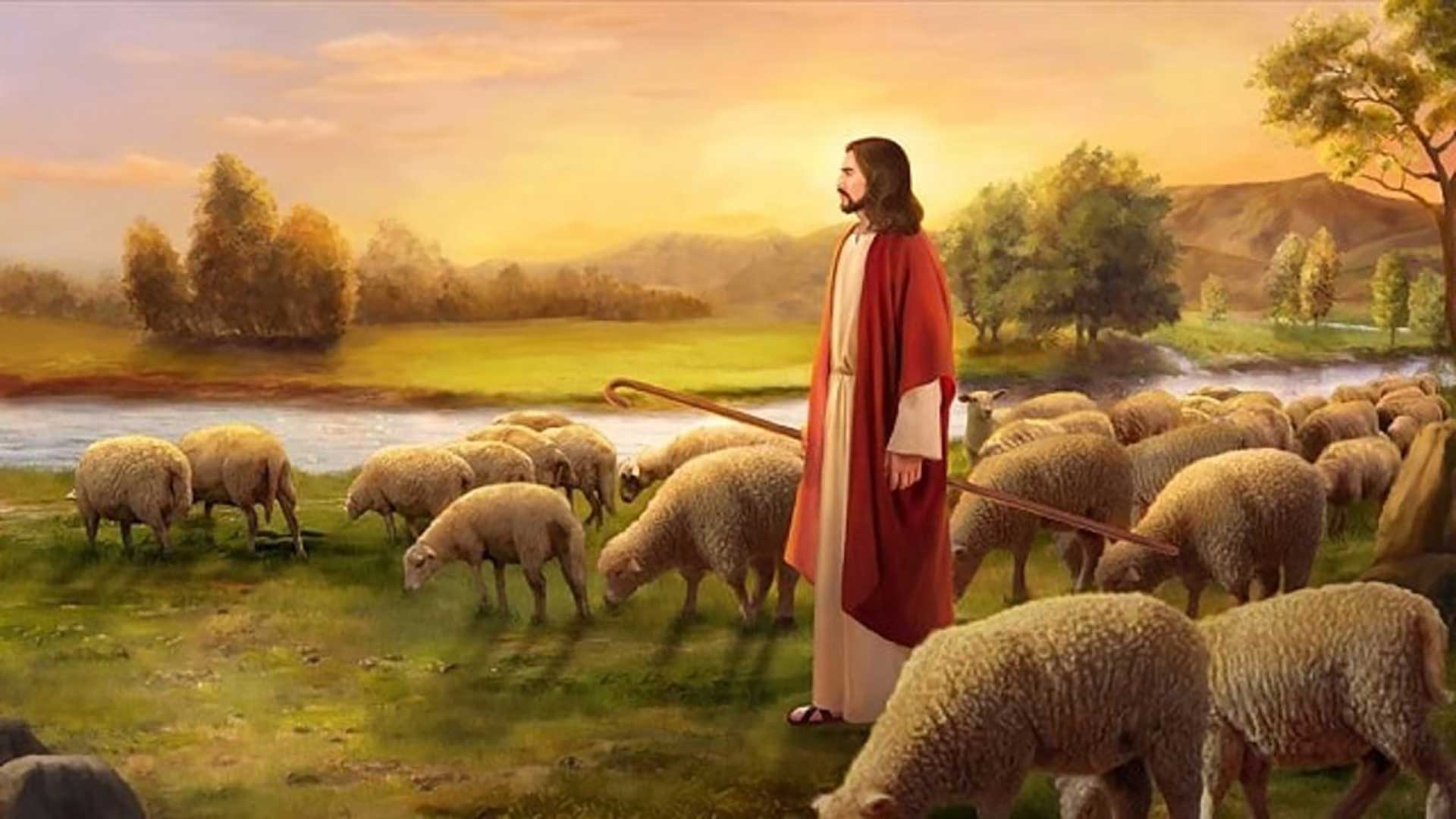Messiah of Peace and Hope
Right from the eleventh Sunday of Ordinary Time, we have been looking at the messianic role of Israel, on the one hand, and, on the other, looking at how Jesus was preparing His disciples for the apostolic mission. And today, the fourteenth Sunday, Zechariah famously announces the coming of the Saviour at an unspecified time in the future and, in the Gospel, Jesus spells out the nature of His Kingdom.
Zechariah is a common name in the Bible. The figure we encounter in the First Reading (Zech 9: 9-10) is one of the twelve minor prophets of Judah (and not to be confused with the New Testament Zechariah who was the father of John the Baptist). Zechariah was born in Babylon where his ancestors had settled after the Babylonian capture of Israel in 597 BC. Some seventy years later, when Babylon in turn was captured by the Persians – whose policy it was to repatriate foreigners and have them worship their own gods – Zechariah and fellow Jews returned to Israel.
The Jews now devised plans to rebuild Jerusalem and the Temple, and to constitute a nation. They were conscious of their status as God’s Chosen People, destined to attract the nations to worship the true God in Jerusalem. This led Zechariah to write in a messianic vein, as is evident from the second part (chapters 9-14) of his book. Hopes of restoring the kingdom of David remained unfulfilled in his time, but half a millennium later, Jesus, the true Son of David, fulfilled those expectations by preaching the Kingdom to the Gentiles, so that every knee may bow and every tongue confess that Jesus Christ is Lord.
The prophecies of Zechariah came true in Jesus’ life. Note how the donkey was Jesus’ choice as He entered Jerusalem. The donkey is looked down upon today but was a noble beast back in the day; it was used by royalty on missions of peace whereas the horse was a herald of war. The significance of Jesus’ choice was surely not lost on the Jews; but while the crowds cheered Him, Jesus silently weeping for His beloved Jerusalem, anticipated that the cheers would soon turn into jeers.
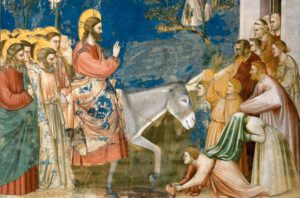
In the Gospel (Mt 11: 25-30), Jesus states that the Kingdom will be more easily reached by the little ones than by the worldly wise, and by the poor rather than by the rich. The children and the poor are more attuned to the spirit of truth and love, which is God’s; the learned elders and the affluent, on the other hand, depend overly on themselves and tend to forget God, until the going gets tough and they can’t get going! Jesus graciously invites all and sundry to come to Him and be at peace; His yoke is liberating, whereas the spirit of the world is jealous and boastful, arrogant and rude; it insists on its own way, is irritable, resentful, and rejoices at wrong (cf. 1 Cor. 12: 4-8).
Our Lord’s teachings are not for individuals alone; it is for societies and countries too. It has the power to raise a civilisation, as it once did, especially in the West. Christianity has inspired art and culture, politics and philosophy; it has influenced ethical and aesthetic standards across human activity, including architecture, education, medical care, music, science. It is quite another matter that the same spirit is now conspicuous by its absence, for many societies and countries have unfaithfully and ungratefully relinquished their gold medals and settled for bronze.
St Paul in the Second Reading (Rom 8: 9, 11-13) teaches us how to live by the Spirit, making it a way of life. As we reflected last Sunday, we ought to live in the supernatural sphere rather than in the natural plane, for as the Apostle of the Gentiles reminds us: ‘You are not in the flesh, you are in the Spirit, if the Spirit of God really dwells in you.’ Just as family members worth their salt partake of the family ethos and thus have a sense of belonging, only those who have Christ’s Spirit belong to Him. Christ’s Spirit is life-giving; the flesh is deadening.
That’s the agenda every Christian should go by, live by, and then, as the Psalmist sings, we will have a multitude of reasons to bless God’s name, give Him glory and praise for evermore for our life of hope and joy.
Banner: https://pixabay.com/photos/jesus-christ-religion-jesus-898330/
God above Self
Placing God above ourselves in word and deed is a sign of our openness to His presence and action in our lives. When we receive God’s representatives, we welcome God Himself; when we place ourselves at their service, it is the Almighty that we serve. In fact, we cannot do without Him: a reminder to the contemporary world that has closed in on itself.
The First Reading (2 Kings 4: 8-11, 14-16a) introduces us to Elisha and to an unnamed, wealthy woman who served him and, upon discerning his holy vocation, sheltered him. Elisha, who was himself the son of a wealthy landowner, had left hearth and home on being selected to succeed Elijah in the prophetic mission. He spent time with Elijah on Mount Carmel; later, he served as royal advisor and became known throughout the kingdom as a wonder worker – not least among the wonders being the blessing of a child to his long childless benefactress.
However, the focus is not on accomplishments but on total trust in God and commitment to His message. This is a point that Our Lord highlights in the Gospel (Mt 10: 37-42) when He says that those who love their kith and kin more than they love Him are not worthy of Him; those who love their life are bound to lose it whereas those who lose it for Jesus’ sake will find it. Whoever takes exception to the Lord’s words knows neither the ways of the world nor the ways of Our Lord: The world appears sweet but is deceitful, whereas Jesus, who comes across as harsh, is truthful.
Jesus is no politician currying favour with His people. He is incredibly frank, straightforward, even blunt – but never false. He does not promise us a bed of roses; on the contrary, He invites us to take up our crosses. He does not encourage us to seek service but to serve as He did, unto death. He does not point to a highway but to the narrow path to Heaven. Had we – not individuals alone but countries as a whole – wholeheartedly embraced the philosophy of the Gospel, the world would have been a better place to live in.
Pope Leo XIII in his memorable encyclical Immortale Dei (1885) [1] reminds us of how once upon a time the world had found favour with God: “There was once a time when States were governed by the philosophy of the Gospel. Then it was that the power and divine virtue of Christian wisdom had diffused itself throughout the laws, institutions, and morals of the people, permeating all ranks and relations of civil society. Then, too, the religion instituted by Jesus Christ, established firmly in befitting dignity, flourished everywhere, by the favour of princes and the legitimate protection of magistrates; and Church and State were happily united in concord and friendly interchange of good offices. The State, constituted in this wise, bore fruits important beyond all expectation, whose remembrance is still, and always will be, in renown, witnessed to as they are by countless proofs which can never be blotted out or ever obscured by any craft of any enemies. Christian Europe has subdued barbarous nations, and changed them from a savage to a civilized condition, from superstition to true worship. It victoriously rolled back the tide of Mohammedan conquest; retained the headship of civilization; stood forth in the front rank as the leader and teacher of all, in every branch of national culture; bestowed on the world the gift of true and many-sided liberty; and most wisely founded very numerous institutions for the solace of human suffering. And if we inquire how it was able to bring about so altered a condition of things, the answer is beyond all question, in large measure, through religion, under whose auspices so many great undertakings were set on foot, through whose aid they were brought to completion.”
Contrast the Pope’s prophetic words with our condition today. The world is in a shambles, with atheism, materialism and individualism reigning supreme. No wonder, Russia has spread its errors across the world and is now attacking Ukraine for petty gains; France, formerly considered the eldest daughter of the Catholic Church, has been facing unrest; and in our country, the social and political scene is unbelievable – so enormous that our Shepherds finding themselves speechless have left the sheep to be devoured by the wolves. Against the particularly devastating scenario in Manipur, Archbishop Peter Machado of Bangalore has been the lone voice crying in the wilderness – God bless him! Meanwhile, the encouraging words from the state's new dispensation for the services traditionally rendered by the Christian community have provided human solace to the archbishop. Proof that the Lord keeps His promises and never abandons those who decidedly stand by Him.
Against this dismal background only the Gospel can give us hope, set us free. St Paul in the Second Reading (Rom 6: 3-4, 8-11) invites us to reflect on the fact that with baptism in Christ we die to sin and are on the path to our final glorification. Therefore, putting God above everything is a good idea. We could well say that only devponn (divinity) can protect our munisponn (humanity), only godliness can save our humaneness. That is Jesus’ radical call for discipleship. So, let us shed our natural approach to life and live supernaturally, putting God first in everything we do. Such a worldview may alienate those kith and kin accustomed to overrating the world; but it will surely keep us at peace with God. We ought to allow nothing to come between us and our God and Saviour, to whom we owe our very existence.
Banner: https://givenscreative.com/2022/11/a-week-of-challenge-servanthood-before-self/
Truth and Trust
Isn’t it ironical that everyone believes that truth must prevail but few are ready to hear the truth (especially when it concerns themselves) and act on it? Scientist, politician and layman alike want to change the world ‘for the better’, yet few have the courage to confront the real truth. Maybe we just don’t trust that the truth will keep us afloat – save us – or maybe we are simply too lazy to change our crooked ways. At any rate, we fail to stand by what is good, right and true and succumb to the forces of darkness. Such lack of integrity will sooner rather than later destroy the social fabric and, what is more, sever our ties with God.
In the First Reading (Jer. 20: 10-13), we see Jeremiah entrusted with a very difficult mission: to announce to unfaithful Jerusalem that it was soon to be torn apart. The people responded with a smear campaign; even friends issued threats and awaited the Prophet’s fall. But Jeremiah was unshakeable: “The Lord is with me as a dread warrior; therefore, my persecutors will stumble, they will not overcome me.” He notes how God “tries the righteous” and comes to their rescue. A lesson in perseverance in the face of opposition.
How many of us stand our ground when it comes to defending the Verum, Bonum, Pulchrum – Truth, Goodness, Beauty? For instance, everyone is quick to criticise a corrupt politician but they mellow in their sight if not melt down at the first sign of trouble. Every one of us has a calling to be prophetic. Jesus shows us the role of prophecy in the church, our churchmen repeat the injunction again and again but how many walk the talk, or simply call spade a spade? There were times when the church hierarchy, from the Pope downwards, authentically stood up to the secular powers and asserted God's law. That had a ripple effect in society and kept it running like a well-oiled machine.
In the Gospel (Mt 10: 26-33), Jesus sends forth His disciples to fearlessly proclaim His doctrine. He promises to expose what is hidden and announce what is merely whispered: He calls us to be upfront about God and His dominion over Creation. However, He cautions His disciples against satanic forces that can destroy body and soul; yet there is none to fear but God who alone has authority over all things. In short, Jesus calls us to be proactive, to acknowledge and stand by Him – for, then, He will stand by us, when we go to our eternal reward. And woe to him who denies Him, for they will be paid back in the same coin.
Expanding the ideas of eternal life and damnation, St Paul in the Second Reading (Rom. 5: 12-15) speaks of how sin and death entered the world through Adam and how humankind was redeemed through the supreme sacrifice of the Second Adam, Jesus Christ. Whereas Adam’s act led to our separation from God and set off our condemnation, Jesus’ Resurrection brought hope of reconciliation with God and ensured our salvation. This is the supreme reality, in the face of which everything else pales out into insignificance.
Today we are invited to examine our lives: to what extent do we believe in the existence of God? How far are we ready to overcome all odds and affirm our faith? To what extent do we trust in the Announcer of the Good News – and in Him alone? Do we suffer from a trust deficit in things that really matter? Or do we at times suffer from overtrust? At any rate, it matters who and what we trust. In the era of fake news, it matters what we finally believe and trust.
At the end of a terrible week that saw Titan go the way of the Titanic, let us realise, before it is too late, that Jesus alone is the Way, the Truth and the Life. When we trust in Him without reserve, there is no titan to fear. Note how the fishing boat trapped in that fierce storm in the Sea of Galilee did not sink as the supposedly unsinkable did the submersible went down in the North Atlantic: rather than the size of the craft or the material used it was the presence of the proverbial Pilot Jesus Christ that made all the difference.
Adoring the Real Presence
All of us at some point or other must have wondered as to why we Catholics consume the Body and Blood of Christ! Today, the Solemnity of Corpus Christi (Latin for “Body of Christ” and short for Dies Sanctissimi Corporis et Sanguinis Domini Iesu Christi, or “Day of the Most Holy Body and Blood of Jesus Christ the Lord”) provides an answer to our concerns. It celebrates the Real Presence of the Body and Blood, Soul and Divinity of Jesus in the Holy Eucharist instituted on Maundy Thursday. On this day, with the shadow of the Cross by now on the liturgy, the Church is at a loss to express her joy at this ineffable gift; hence, a special feast.
This feast has an interesting history. Whereas from the earliest centuries, the Church believed that the elements used in celebrating the Eucharist changed into the Body and Blood of Christ, it was only at the Fourth Lateran Council (1215) that the doctrine was termed as "Transubstantiation". In the year 1226, canoness and mystic Juliana of Liège had visions of Our Lord, who asked her to work towards the institution of such a feast but this happened only twenty years later and only locally. In 1263, at Bolsena, Italy, when a consecrated host that bled onto a corporal at the altar was considered a Eucharistic Miracle, by St Thomas of Aquinas, at his behest Pope Urban IV issued a papal bull Transiturus de hoc mundo (1264) (unprecedentedly) declaring a universal feast: that of Corpus Christi.
However, both before and after this watershed year, there was continued scepticism about the Body and Blood consumed in Holy Communion. Back in Jesus’ time, the Jews considered the very proposal a gross violation of the Mosaic law, but Jesus insisted that only “He who feeds on my flesh and drinks my blood has life eternal, and I will raise him up on the last day.” Early Christians were accused of cannibalism, so much so that, while persecution by Jews and Romans alike was rife, the faithful felt compelled to celebrate the Holy Eucharist in the privacy of their homes or in the catacombs.

Nonetheless, Jesus who is at the centre of all history had to be right. Note how Jesus’ radicality was born with Him in the manger (feeding trough) in Bethlehem (literally, ‘house of bread’), and was confirmed at the Last Supper when He declared unequivocally that He is the Bread of Life. On hearing objections, He did not soften his language but reinforced it. Obviously, taking Jesus at His word, the Church teaches that the Eucharist is not symbolic but real, in fact, “the source and summit of Christian life”. It is said that just as death came into the world by eating the forbidden fruit, eternal life is restored by eating the Bread of Life. If His flesh is food, by the same logic, His blood is drink.
Meanwhile, the First Reading (Deut. 8: 2-3, 14-16) speaks of manna – a perishable bread! Moses told his people that by this God made them know “that man does not live by bread alone, but that man lives by everything that proceeds out of the mouth of the Lord” (which, in the New Testament, is also Jesus’ wise retort to Satan in the wilderness). Moses was only exhorting his people to remember God not only in bad times – when they need His help – but also in good times, when they tended to forget Him.
In the Second Reading (1 Cor 10: 16-17), St Paul too highlights the sublime mystery that is the Holy Eucharist. He shows the sheer incompatibility of the Christian eucharistic feast and pagan sacrificial banquets. The Eucharist is truly sacrificial in nature and bears the Real Presence of Christ. The Apostle of the Gentiles draws our attention to the power of the Eucharist – that “because there is one bread, we who are many are one body, for we all partake of one bread.” The Israelites of old merely consumed the offerings; Christians who consume the Body and Blood of Christ gain eternal life.
Finally, Joan Carroll Cruz's Eucharistic Miracles and Eucharistic Phenomenon in the Lives of the Saints (Tan Books: 1991) and others on the same topic will let us see, concretely, how "real" the Presence is. While the Holy Trinity is a central tenet of our faith, as we saw last Sunday, the Holy Eucharist, being a real communion with Christ, is a central feature of ecclesial life and most worthy of perpetual adoration.
https://www.youtube.com/watch?v=r3H5f7oePQE
The Holy Trinity, a deep Mystery!
Close on the heels of Sunday of the Holy Spirit comes Sunday of the Holy Trinity, this latter being the central mystery of our faith and life (CCC 234). We believe in One God, who is not alone, solitary, but a Trinity, a Triune God, a divine family of life and love. As the Father sent His Only Son, the Second Person of the Holy Trinity, Jesus Christ, to be born in the world; and, in turn, Jesus Christ, who upon ascending to the Father, made sure that the Third Person, the Holy Spirit, would descend upon the world, it is but natural that we acclaim them all together today – in the Solemnity of the Holy Trinity.
The First Reading (Exod 34: 4-6, 8-9) takes us back to the beginning, to witness Moses’ encounter with God the Father. God rightly introduces Himself as “merciful and gracious, slow to anger, and abounding in steadfast love and faithfulness.” This delightfully accurate self-description so comforts Moses that he promptly invokes his “stiff-necked people” (a true description of the miserable human race) who, by relapsing into idol worship, had provoked Moses into breaking the tablets inscribed with the Decalogue. Moses calls upon God to pardon their iniquity and their sin, and take them for His inheritance, or say, forgive their shortcomings, restore them to health and become beneficiaries of His love.
The Gospel (Jn 3: 16-18) refers to the Second Person, in the words of none other than Jesus Himself: “God so loved world that He gave His Only Son, that whoever believes in Him should not perish but have eternal life.” Here we have an endorsement of God’s love and the promise of eternal life to those who believe in Him. In the words of bishop St Cyprian of Carthage (3rd century AD), salus extra ecclesiam non est, or extra Ecclesiam nulla salus, which means that outside the Church there is no salvation.
So, what about “he who does not believe”, as Jesus put it? God’s love expressed through Jesus – who died to save us – is so great that we lose our salvation if we do not stand by Him and embrace the Faith. This is what the Catholic Church has traditionally taught. The present Catechism of the Catholic Church, quoting Vatican II document Lumen Gentium, explains: “Those who, through no fault of their own, do not know the Gospel of Christ or his Church, but who nevertheless seek God with a sincere heart, and, moved by grace, try in their actions to do his will as they know it through the dictates of their conscience – those too may achieve eternal salvation.” (CCC 847) Food for thought and discussion beyond the Reading of the day!

The Second Reading (2 Cor 13: 11-13) speaks of the Holy Spirit. St Paul teaches us to greet one another saying, “The grace of the Lord Jesus Christ and the love of God and the fellowship of the Holy Spirit be with you all.” Familiar words. That’s how the Apostle of the Gentiles ends his letter to the Corinthians; and that’s how we begin the liturgy of the Holy Sacrifice of the Mass. So routinely do we pronounce these words that we fail to appreciate their deep meaning.
The fact is that none can claim to have fully understood the Holy Trinity. But, as the Catechism says: “God has left traces of his Trinitarian being in his work of creation and in his Revelation throughout the Old Testament. But his inmost Being as Holy Trinity is a mystery that is inaccessible to reason alone or even to Israel's faith before the Incarnation of God's Son and the sending of the Holy Spirit (CCC 237). The Father is revealed by the Son; the two are revealed by the Spirit (CCC 238-248) The whole divine economy is the common work of the three divine persons. (CCC 258) The ultimate end of the whole divine economy is the entry of God's creatures into the perfect unity of the Blessed Trinity. (CCC 260)
So, how do we proceed from here? Even before trying to delve into the Mystery, we must acknowledge how privileged we are as Christians to have been let into what is indeed the Mystery of the intimate life of God. It is profound, simply overwhelming, incomparable! If we have not fully understood it – and we never will – there is nothing to fear. St Augustine tried to reason out, but to no avail; there is that famous story of how a little child set his questions at rest…. So, out of the mouths of babes...!
On the other hand, what the mind cannot do, our hearts can – faith can! How does a mother understand her baby who only babbles? She does it with love. And that is how, even with reference to everyday things, we may understand the working of the Trinity, "God has left traces of his Trinitarian being in his work of creation". One popularly quoted instance is the flame of fire, which has three attributes (heat, light and shape) and yet is one; and can never be a flame of fire if one of them is missing! The same trinitarian spirit must inspire our domestic life.
Today provides us with an opportunity to meditate upon this fundamental Mystery of our faith and love and to initiate a personal relationship with each of the three Persons of the Holy Trinity!
Pentecost and Proclamation
Today, the eighth Sunday of Easter, we celebrate Pentecost, or say, the fiftieth day after Easter. It marks the descent of the Holy Spirit upon the disciples. The intimate connection between the two feasts will be lost on us if we do not look at its pre-Christian background.
In the old Jewish tradition, the feast of Shavuot was the fiftieth day after the Pesach (Passover). This was held to commemorate the liberation of the Jews from slavery in Egypt. On this occasion, many Jews from countries around the Mediterranean came on pilgrimage and stayed on till the Shavuot. This was at first an agricultural feast (a thanksgiving for the first fruits of the wheat harvest) but later came to be related to the receiving of the Law by Moses on Mount Sinai.
On the other hand, a new tradition began when the Resurrection coincided with the day of the Passover. In fact, the Resurrection replaced the Passover, for precisely by His death and resurrection, Jesus offered the world freedom from death and sin. Similarly, fifty days later, or say, coinciding with Shavuot, Jesus sent down the Holy Spirit upon His disciples. Thus was Shavuot Christianised and called Pentecost, Greek for ‘fiftieth day’.
So much for the relation between the old and the new.
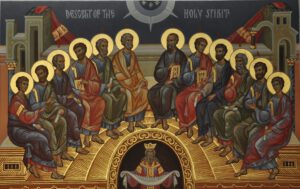
In the first Reading (Acts 2: 1-11), St Luke describes the marvel of Pentecost. The disciples and others were gathered to celebrate Shavuot when there was a rush of a mighty wind and tongues as of fire came to rest on each of them. While the wind represents the breath of God blown into the disciples, the fire represents the courage and enthusiasm that filled the disciples.
Concretely speaking, the Pentecost represents the foundation day of the Church. On this day, Jesus sent down the Holy Spirit to guide and inspire the disciples on their mission to preach the Gospel, just as He had promised them before he ascended to the Father. “As the Father has sent me, even so I send you,” says the Gospel (Jn 20: 19-23; a longer form of which was read on the Second Sunday of Easter).
To effectively carry out missionary work, each member of the community received (and still receives) one or more gifts and charisms. There are seven gifts of the Holy Spirit: wisdom, understanding, counsel, fortitude, knowledge, piety, and fear of the Lord. Whereas gifts are “permanent dispositions which make man docile in following the promptings of the Holy Spirit” (CCC 1830) given primarily for the purpose of personal sanctification, charisms (e. g. healing) are special gifts given for the common good, or say, the good of the Church (cf. CCC 798 ff).
. Significantly, on the Birthday of the Church, there were people separated by languages, cultures, races and nations (all symbolised by the expatriate Jews present over there): they now formed the new People of God.
So, how important, really, is the Holy Spirit? St Paul, in the Second Reading (1 Cor 12: 3-7, 12-13) says that “no one can say ‘Jesus is Lord’ except by the Holy Spirit”. It is the same Spirit that fills us with charisms, and lets us serve, each according to our gift. While the charisms and services are varied, it is the same Lord. “To each is given the manifestation of the Spirit for the common good.” Which implies that our life must be dedicated to the Truth that is God and to the service of the community.
This community is fundamentally the Church. Jesus is the tree or the body, and, correspondingly, we are the branches or the members. The Holy Spirit keeps us united and drinking of the same belief in the True God.
Can there be any doubt, then, that the Church is a divine rather than a human institution? The Holy Spirit gives it life. The same baptism of fire that the apostles received we too do receive through the Sacrament of Confirmation. The gift of tongues symbolises the fact that the Church goes out to the peoples of the world and adapts to their culture while doing what she has been called to do: most clearly proclaiming Our Lord Jesus Christ and Him alone. That is how intimately the proclamation of the Gospel is related to the Pentecost.
A hymn for Pentecost: https://youtu.be/5GrQJGQWfd8
Ascension: Heaven and Earth drawn near
Even just the last two mysteries of the life of Jesus – the Resurrection and the Ascension – are sufficient to convince us that Jesus is God. The Resurrection shows that Jesus not only rose from the dead but also never died again. In his new, glorified body, Jesus revealed Himself at many locations, over a significant forty-day period. Now, before the apostles’ very eyes, He ascended to His Father, and has been there ever since.
The two mysteries are not only embedded in Scripture, they are recognised by several non-Christian historical sources as well. Even some writers hostile to Christianity attested to the historicity of Jesus and the Resurrection, among them, Stoic philosopher Mara (c. 73 AD) in a letter to his son Sarapion; the Greek-writing Jewish priest Flavius Josephus in his book Jewish Antiquities (c. 93 AD), the influential Roman historian and senator Tacitus in his Annals (c. 116 AD); another Roman historian, Suetonius, in his Lives of the Twelve Caesars (c. 121 AD); and the Talmud (c. 400 AD), a collection of ancient Jewish laws.
If about the Ascension, there seems to be only Scriptural testimony, it is possibly because the eleven apostles alone were privy to the marvel. St Matthew (28: 16-20) and the Acts of the Apostles (1: 1-11) – both of which form the Gospel and the First Reading of today; St Mark (16: 15-20) and St Luke (24: 46-53) (earmarked for Years B and C of the liturgical year) talk about the Ascension. Curiously, the Old Testament too refers to the Ascension, in Psalm 68: 18, a reference that St Paul has used to great effect. In the Second Reading today, we read a passage from his letter to the Ephesians (1: 17-23).
Here is how The Catholic Encyclopaedia describes the glorious Ascension: “Although the place of the Ascension is not distinctly stated, it would appear from the Acts that it was Mount Olivet, since after the Ascension the disciples are described as returning to Jerusalem from the mount that is called Olivet, which is near Jerusalem, within a Sabbath day’s journey. Tradition has consecrated this site as the Mount of Ascension and Christian piety has memorialized the event by erecting over the site a basilica. St Helena built the first memorial, which was destroyed by the Persians in 614, rebuilt in the eighth century, to be destroyed again, but rebuilt a second time by the crusaders. This the Moslems also destroyed, leaving only the octagonal structure which encloses the stone said to bear the imprint of the feet of Christ, that is now used as an oratory.
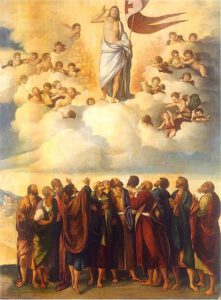
“Not only is the fact of the Ascension related in the passages of Scripture cited above, but it is also elsewhere predicted and spoken of as an established fact. Thus, in John 6: 63 Christ asks the Jews: ‘If then you shall see the Son of Man ascend up where He was before?’ and in 20: 17, He says to Mary Magdalen: ‘Do not touch Me, for I am not yet ascended to My Father, but go to My brethren, and say to them: I ascend to My Father and to your Father, to My God and to your God.’ Again, in Ephesians 4: 8-10, and in Timothy 3: 16, the Ascension of Christ is spoken of as an accepted fact.
“The language used by the Evangelists to describe the Ascension must be interpreted according to usage. To say that He was taken up or that He ascended, does not necessarily imply that they locate heaven directly above the earth; no more than the words ‘sitteth on the right hand of God’ mean that this is His actual posture. In disappearing from their view ‘He was raised up and a cloud received Him out of their sight’ (Acts 1: 9), and entering into glory He dwells with the Father in the honour and power denoted by the Scripture phrase.”
To positivists and rationalists who may mock the doctrine of the Ascension, the all-important twentieth-century author of Miracles , C. S. Lewis, states interestingly that after the Resurrection, it may have been that Jesus, “a being still in some mode, though not our mode, corporeal, withdrew at His own will from the Nature presented by our three dimensions and five senses, not necessarily into the non-sensuous and undimensioned but possibly into, or through, a world or worlds or super-sense and super-space. And He might choose to do it gradually. Who on earth knows what the spectators might see? If they say they saw a momentary movement along the vertical plane – then an indistinct mass – then nothing, who is to pronounce this improbable?”
In the universality of its observance, the Ascension ranks with Christmas, Easter, and the forthcoming Pentecost. The Ascension completes a glorious cycle which began with the Incarnation; so, it makes perfect sense that Jesus who deigned to come into the world should, at the end of his mission of reconciling man to God, return to the bosom of the Father. His momentous last words on the occasion bear this out. For our part, we must bear Him witness throughout our pilgrim journey on earth, also gratefully acknowledging that, through His Ascension, Heaven and Earth have drawn near.
Banner: https://rb.gy/bahmj
Pondering God’s commandments, with love
As we inch towards the Ascension and Pentecost, we see heartening changes in the incipient Christian community. In the First Reading (Acts 8: 5-8, 14-17), we meet Philip, one of the seven deacons. He is presently in Samaria, where his preaching fell on good soil. The people were in awe of his words and miracles, and relieved on being delivered of evil spirits. On hearing that encouraging update in Jerusalem, apostles Peter and John were dispatched double quick to lay their hands over the Samaritans and pray that they too receive the Holy Spirit.
Samaria awaited a Messiah but was traditionally considered idolatrous ever since a temple to Baal was erected there by King Ahab. So, why was the region suddenly privileged to be in the forefront of evangelisation? Philip had ventured there because Jesus Himself had preached in the area (cf. the story of the Samaritan woman at the well) and wished that the Gospel be taken there after His ascension. Thus, Jesus implied that the Good News of Salvation was meant to reach one and all. It is doubly significant that Philip, not an apostle but a deacon, whose main job was to relieve the apostles of menial chores, became the first foreign missionary in Christian history.[1]
The act of reaching out to Samaria has since had far-reaching implications. The church in Samaria was to Jerusalem what a local church today (say, the archdiocese of Goa and Daman) is to the universal church. The arrangement throws light on the very meaningful hierarchical structure that has governed the Church for the last two millennia; it speaks volumes for the issuance and teaching of doctrine centrally, from the headquarters in Rome, so that all of Christendom is of one mind; and finally, it points to the communion of saints, or say, the fellowship of those united with Christ across space and time.[2]
For Christ to be present with His people across space and time is no mean feat; but to God nothing is impossible. It is a fulfilment of what Our Lord had promised in his farewell discourse, just before His Passion and Death. He had said that after His Ascension, the Holy Spirit would be with the Christians till the end of times; the Spirit of truth would pick up from where He had left off, to illumine and strengthen all the faithful. There is no denying that, inasmuch as we keep the commandments, we grow in wisdom and stature, and live in spiritual unity and love of God. God is then always in our midst.

But, really speaking, who has the strength to keep the Lord’s commandments? Only those who love Him will do so, says Jesus, quite plainly, in the Gospel today (Jn 14: 15-21). Yes, it demands total commitment – difficult, but not unreasonable or impossible. Don’t spouses, children, bosses, friends, clubs, expect the same? Don’t we, then, respect rules and keep promises; and when we don’t, we quit – or are obliged to quit? Why, then, should a relationship with the divine be any different? In fact, our commitment should have been infinitely stronger; but alas, it isn’t, simply because for far too long we have been accustomed to taking God for granted. ‘God will understand’ is a lame explanation, and a convenient ruse to flout rules and break promises.
Concretely, let us look at the First Commandment: "You shall worship the Lord your God and Him only shall you serve." It summons us to believe in God, to hope in Him, and to love Him above all else. "You shall love the Lord your God with all your heart, and with all your soul and with all your strength" (Deut. 6:5). Adoring Him, praying to Him, offering Him the worship that belongs to Him, fulfilling the promises and vows made to Him are acts of the virtue of religion.
On the other hand, superstition is a departure from the worship that we give to the true God. It is manifested in idolatry, as well as in various forms of divination and magic. Similarly, atheism is a sin against the first commandment, since it rejects or denies the existence of God.[3] Yet, what is the in-thing? To keep God out of one’s day-to-day dealings, if deemed socially and/or politically expedient. This is the antithesis of the First Commandment that we are expected to profess and practise; what the score will be on the remaining nine is anybody’s guess!
St Peter in the Second Reading (1 Pet 3: 15-18) therefore counsels us to revere Christ as Lord; defend those who are on God’s side; do the right thing, in the right way, so that none can point an accusing finger at us. “For it is better to suffer doing right, if that should be God’s will, than for doing wrong,” he adds. We ought to muster courage by summoning up the memory of Our Lord’s undeserved death for our sins. As regards us, we run the risk of being hated or even put to death for siding with God, but we may rest assured that we will be made alive in the spirit by the same God who has conquered sin and death: Jesus Christ our Lord.
A tall order? If we listen to God’s commandments – with our minds and hearts – pondering what they mean to us here and now, we will invariably be assisted by the Holy Spirit. As Jesus has cautioned, the dark world of unbelief is incapable of understanding and accepting the Spirit of truth – which will be accessible only to those who love and revere Him!
[1] Philip famously converted an Ethiopian eunuch, thus inducting a black into the church at a very early stage. Then he proceeded to evangelise other areas up to Caesarea; Greece, Syria and Phrygia.
[2] Those living are said to constitute “the church militant”, while the dead who are in Heaven, “the church triumphant”, and those in Purgatory, “the church suffering”. Yet the three groups are in communion of the Spirit.
[3] Cf. Catechism of the Catholic Church, https://www.vatican.va/archive/ENG0015/__P7G.HTM
With eyes of faith
It must have been exciting to be part of the early church. Yet, look how there was disagreement and discrimination at its very inception (Acts 6: 1-7). The Hellenists, Greek-speaking Jews who had returned from the Diaspora, felt discriminated against by the Hebrews, who were local, Aramaic-speaking Jews. Fortunately, to prevent mundane concerns from sapping their energy (in this case, Hellenic widows receiving second-class treatment in food distribution), the Apostles appointed seven helpers or deacons to take care of those worries. Of course, these seven were men of faith and filled with the Holy Spirit; while they helped safeguard social cohesion, the Apostles immersed themselves in the work of evangelisation.
Such wise principles have governed the church ever since. To illustrate it with something very familiar to us, the early church in Goa set up Fábricas to look after the temporal affairs of the parish, while the Confrarias or brotherhoods focussed on spiritual matters. It is not that Fábrica members were worldly-wise and only the confrades holy; faith and morality were essential to membership of either association. But, all in all, the arrangement brought balance to the individual and the community…. Have we strayed from those guiding principles, and consequently, are those bodies now a far cry from what they were meant to be?
Not those bodies alone – but our own bodies and souls are in need of d-e-l-i-v-e-r-a-n-c-e – deliverance – prayer to bring healing and wholeness to us who are struggling with bondage to sin and demonic influences. Haven’t many of us Christians – and, sadly, some of our leaders too – rejected the living stone that in God’s sight is “chosen and precious”? That living stone is Jesus Christ, the Son of God. In the world today, and Goa in particular, it is high time we realised our folly and decidedly turned back; before long the rug will be pulled out from under our feet by the very people that we had once blindly trusted. Alas, it will be a mighty fall, which only a mighty exercise in faith can prevent – deliver us from! The recent happenings in Manipur are a case in point; living stones are sought to be smashed and life snuffed out of the living church.[1]

St Peter (1 Pet 2: 4-9) calls us to be living stones and build ourselves into a spiritual temple. Well, one can lead the horse – er, the sheep – to the water but can one make it drink? We have built magnificent houses of God, but how many care to drink deep of the knowledge of God? The first Apostle reiterates that we are “a chosen race, a royal priesthood, a holy nation”, and our bounden duty, to “declare the wonderful deeds of Him who called you out of darkness into His marvellous light”! Once again, for us in Goa, it is important that we open our eyes to the gift of faith that our ancestors have handed down to us; and it is equally a matter of gratefully passing on that faith – in a pristine condition, that is – to the communities around us. Only then can we think of ourselves as ‘living stones’ of the local and the universal Church.
A proper reflection on our first Pope’s enduring call will not only make our (Sun)day, it will have a considerable bearing on our community life for generations to come. In the wake of that tragic update about Goan Catholics straying into forbidden territory,[2] the Gospel today couldn’t be more pertinent. In answer to Thomas, that courageous Apostle who travelled to India, Jesus, in his farewell discourse at the Last Supper, said: “I am the Way, the Truth and the Life”!
How many times do our shepherds have to drum this message into us – seventy times seven? We the flock should not presume that it will always be possible for our shepherds to go in search of their sheep and bring them back to the fold, restore and heal them! Very often we will have to remember these lessons ourselves or learn them from our somudai or community, which have to rise to the occasion in prayer and a spirit of service.
The Gospel passage (14: 1-12) speaks so unambiguously to us that we almost hear Jesus’ say: “Have I been with you so long, and yet you do not know me?” How come we still do not know the Master’s voice? Do we not believe that He is God, that He is in the Father and the Father in Him? Ever since He became Man, He is within our reach. Haven’t we in Goa had Jesus for the past half a millennium and more? What is the use of declaring from the rooftops, “bhavarth amcho nhoi aicho kalcho, punn Sam Fransisk Xavieracho” (Our faith is not of recent origin; it goes back to the days of St Francis Xavier)[3] if we continue to set our eyes on the idols that the Apostle of the Indies had got out of our sight?
Today, let us reaffirm our resolve to follow Him who is the Way, the Truth and the Life. Let us keep the faith; let no other, however exalted his position, destroy it for us by presenting pastures new. As Jesus has twice said in Jn 14, “Let not your hearts be troubled”! And, yes, let us not depend on our physical eyes to see Him; we can see Him with eyes of faith (below, a hymn to help us reinforce it). We ought only to root out misplaced customs and usages, and let the words of Jesus take root in our souls instead.
| Tuka amim polleunk nam (1 Ped 1, 8)
Tuka amim polleunk nam, punn Tujer amcho bhavart, Jezu amchea Taroka! Jezu, sorv utram Tujim sasnnachea jivitachim: konna-xim vochum ani!
Tuka amim polleunk nam, punn Tujer visvas tthevtanv, Jezu, amchea Taroka! Jezu, Tum eklo amkam bhasaitai sasnnik jivit: bhasavnnen pett´ta visvas!
Tuka amim polleunk nam, tori môg Tuzo kortanv, Jezu, amchea Taroka! Jezu, Tum chôdd-chôdd boro sogllo môg Tuka favo: amchem sukh Tujea mogan! |
We have not seen You (1 Pet 1, 8)[4]
We have not seen You, but our faith is in You, Jesus our Saviour! Jesus, precious words of Yours of eternal life: to whom can we go:
We have not seen You, but we place our faith in You, Jesus, our Saviour! Jesus, You are the only one for us You destine for us eternal life: This command raises hope! We have not seen You, and yet we love You, Jesus, our Saviour! Jesus, You are so good You deserve all our love our happiness is in Your love! |
[2] See http://www.oscardenoronha.com/2023/04/30/mary-to-mira-just-a-sound-away/
[3] Popular wisdom enshrined in the hymn “Dev amkam zai”, Gaionancho Jhelo, hymn F 3.
[4] Type: Hymn. Source: Gaionacho Jhelo, 1995 edition, R-40. Lyrics: Vasco do Rego, S.J. Music: Olavo V. Pereira. Publisher: Gõychi Sevadhormik Somoti (Pastoral Institute), Old Goa, Goa 403 402. Translated by: Alfred Noronha, Pandavaddo, Chorão, Goa 403 102. August 2005.
“The Lord is my Shepherd”
In our somewhat directionless world, isn’t it reassuring to hear our inner voice say, “The Lord is my shepherd, there is nothing I shall want”? These verses from the David’s Psalm echo through the three Readings of today; not only were they said by Jesus in His own lifetime, Peter repeats them endlessly after the Resurrection.
After the Resurrection, it was important to catechise. We see once again, in the First Reading (Acts 2: 14, 36-41), how the first Apostle reproached people for putting Jesus to death and urged them to repent. The reward for their repentance would be to receive “the gift of the Holy Spirit”. The pardon of our sins, the gift of the Holy Spirit and the New Covenant are the fulfilment of messianic promises. They are open to anyone who accepts the Word of God and transforms their life. And what a privilege, as St Peter puts it, “The promise is to you and to your children and to all that are far off, every one whom the Lord our God calls to Him.”
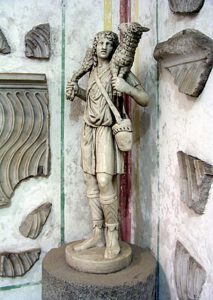
Again, in his First Letter, part of which forms the Second Reading of today (1 Pet 2: 20-25), St Peter conscientizes the people. He talks about how Jesus who is at once our Shepherd and Paschal Lamb. By His voluntary Sacrifice, He showed us the way from death to life eternal. St Peter therefore invites us to suffer, as Jesus did, in the midst of life’s difficulties, which include misunderstandings, calumnies, accusations and persecutions, all of which Christians suffer for being a stumbling block and rock of offence to the world.
Through it all, we learn from the Gospel (Jn 10: 1-10), we have nothing to worry, for Jesus the Good Shepherd is always by our side. He knows His Father in Heaven very intimately, and know us too with the same intimacy. He thus becomes “the door” to Heaven, the Mediator par excellence to our Father in Heaven. And His warning against false teachers and doctors – “thieves and robbers” all – is valid for all times, especially our own. He is the Way, the Truth and the Life; He is our only salvation. He is the door; anyone who enters by Him alone will be saved.
This Sunday, then, is rightly known as “Good Shepherd Sunday”. May we trust only Jesus to be our Shepherd through life; through Him alone can we have life, and life in abundance. Above all, may our Pope, our bishops and priests be good shepherds, taking the lay faithful always to the right pasture.
